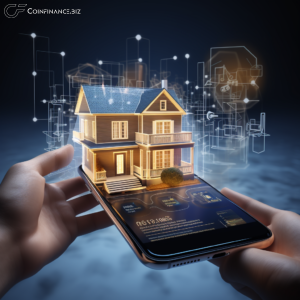Non-Fungible Tokens (NFTs) have emerged as a revolutionary digital certification for property ownership. When applied to real estate, NFTs represent a unique opportunity to digitally certify and transfer property ownership, potentially disrupting traditional property transactions.
Real Estate Transformation through NFTs
The real estate market witnessed the power of NFTs when a house in Atlanta was converted into an NFT and sold for an astounding $214,882 within just three minutes last March. The success of this sale was made possible through the collaboration of two real estate tech startups, Roofstock and RealT. Furthermore, digital artist Krista Kim made headlines by selling her Toronto-based virtual house, known as “Mars House,” as an NFT, fetching over $500,000.
Real-World Examples of NFTs in Real Estate
Blockchain technology opens up endless possibilities for real estate tokenization. Assets like title policies, deeds, certificates of authenticity, and maintenance records can be converted into tokens using this technology. NFTitle is a prominent platform leveraging blockchain-agnostic technology on the distributed web to offer a unique homeownership experience through the tokenization of real–world assets. Over the years, NFTitle has integrated its technology into US and global title companies, enabling the minting of essential assets for current and potential customers.
TitleMint is another noteworthy project that aims to create a national archive of title insurance policies, streamlining and accelerating the research process for prospective homeowners.

The Benefits and Challenges of NFTs in Real Estate
NFTs bring several advantages to the real estate industry, including enhanced liquidity, democratization of property ownership, and the potential for fractional ownership. However, they also present their fair share of challenges, such as regulatory concerns, technical hurdles, and public perception.
One of the most significant advantages of NFTs is increased liquidity. By digitizing properties into NFTs, real estate transactions can be conducted more efficiently, significantly reducing the time it takes to buy or sell a property.
Democratization of property ownership is another compelling aspect of NFTs. Fractionalization allows more individuals to invest in real estate without having to purchase entire properties, making the market more accessible to a broader population. Moreover, NFTs facilitate transparency through the use of blockchain technology, providing tamper-proof records of transactions and potentially eliminating fraudulent activities and disputes related to property ownership.
However, NFTs also face challenges. Regulatory issues pose a significant hurdle, as the use of NFTs and blockchain technology in real estate is still relatively new, resulting in varying regulations across jurisdictions. Additionally, technical complexities may deter some individuals from embracing NFTs fully. To overcome this, user-friendly and widely understood interfaces for blockchain technology and NFTs need to be developed, and trust in this new mode of real estate transaction must be built over time.
Future Perspectives of NFTs in Real Estate
NFTs are set to continue reshaping the real estate sector due to their transformative potential. Their integration promises more efficient, secure, and transparent property transactions, along with the opportunity for fractional property ownership and increased access to global real estate markets.
Technological advancements will likely lead to more sophisticated applications of NFTs in real estate. For instance, combining smart contracts with NFTs could automate various aspects of the real estate transaction process, enabling smoother and faster deals.
Furthermore, NFTs and blockchain technology open up the possibility of fast cross-border transactions, allowing individuals to invest in properties worldwide without being limited by geographical constraints.
The growth of virtual and augmented reality technologies also presents exciting possibilities for NFTs in the real estate market. Prospective buyers could explore properties virtually, and NFTs could be utilized to secure purchases in these digital environments, further revolutionizing the way real estate transactions take place.




